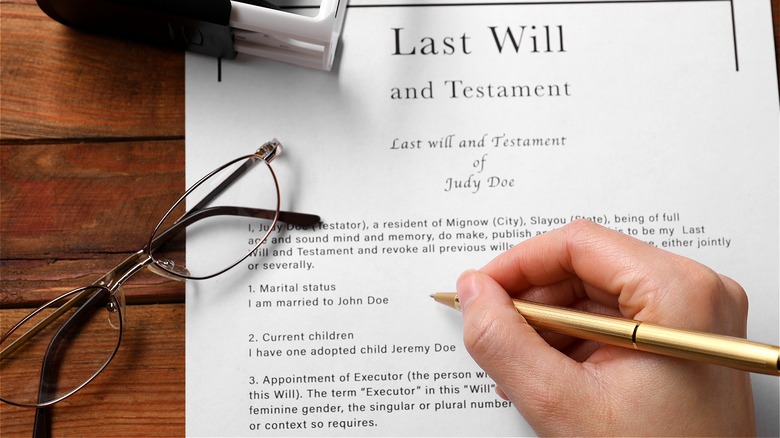Once You Hit This Age, You Should Have A Will
Death. It's hardly anyone's favorite subject, particularly when the death in question is one's own. While the existential dread and confusion over what it means not to be alive anymore is unsettling enough, contemplating death also invites a slew of technical dilemmas. To start, there are funeral arrangements and costs to consider, but also the fate of your mortal remains to address, debts to settle, and the question of who gets all the stuff you can't take with you when you go.
A practical solution to most of these outstanding questions is to put your wishes down in a last will and testament. Properly written and witnessed, a will (do you need a lawyer to write one?) can make all your wishes plain and provide the legal standing to see them carried out after you die. But when, exactly, should one start writing a will? It might seem like one of those things to do late in life, not sooner than middle age. It also might seem like the sort of thing only done by those of means.
But a will is a useful safeguard for your posthumous wishes whatever your economic class. And prepping it, according to many financial experts, can't begin soon enough. In the United States, it's recommended you consider writing a will as early as age 18, the legal age in most states.
Life, not age, determines when it's best to write a will
It's unlikely, particularly in 21st-century America, that a person is going to die at age 18. And a young person may not have much in the way of wealth and assets, considering they've just entered adult life (not to mention the economic climate of our age). However, it's better, say many financial advisers, to let life's events dictate when you draft a will and testament, rather than the age you happen to be.
And there are life events that come at you early in adulthood. Reaching legal age is when many people establish or take control of their financial affairs, and even a small savings account is worth designating to a loved one or an institution in the event something happens to you. And while the average age for marriage has gone up significantly in the past few decades, it still comes fairly early in life for many adults. However old you are and however slim your assets may be, combining them is good cause to begin planning out what to do with them after you die. The same goes for when assets are split, in the event of a divorce or the dissolution of a business partnership.
Occupation might be another reason for a young adult to start writing a will. Military service, for example, or any job involving remote travel, poses a significant enough health risk to warrant getting your affairs in order. And any health scares or major illnesses, particularly mental illness, argue in favor of making a will early, while you're still of sound mind and body. (Find out what happens to your money if you die without a will.)
Wills can be amended throughout life
This said, even with ample reasons for writing a will early in adulthood, many young people still might not feel it necessary, or a pleasant thing to do, as it means thinking about the end of their lives. Further, assuming one enjoys a full measure of life, one's circumstances in old age aren't likely to match what they were back at 18 or 21. (Speaking of which, here are 20 money truths we wish we knew in our 20s.)
But a will isn't a stagnant document. A person can revise it at any time, assuming they're of sound mind. Many people revisit their wills, amending them to reflect new or lost assets, new additions to a family, or simply a change of mind. And financial advisers encourage people to update their wills at certain ages, as well as in response to certain triggers. Having children, acquiring cars and homes, setting up a retirement fund, and hitting retirement can all be good causes to revise a will.


